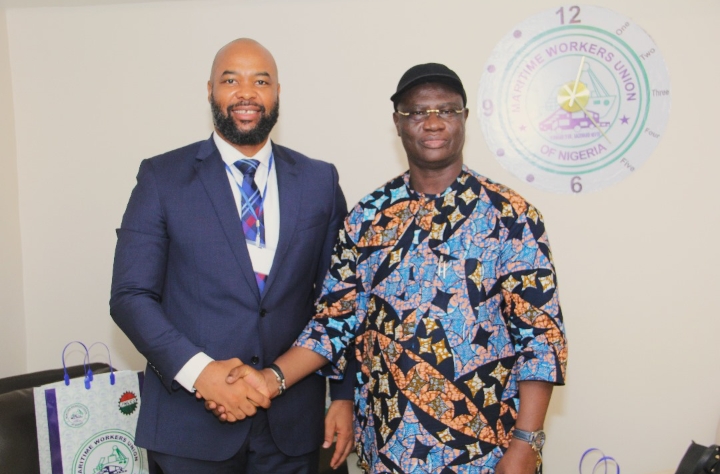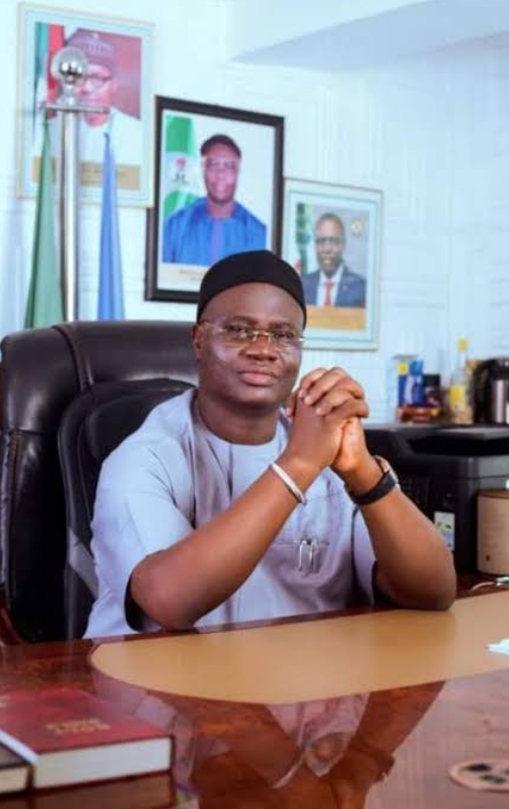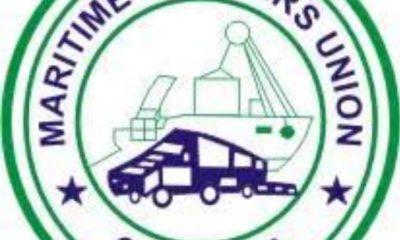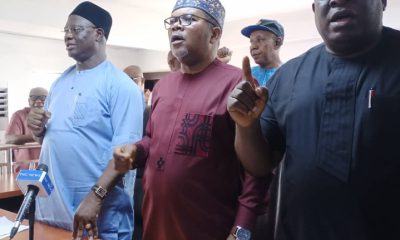Maritime Agencies
Blue Economy in Focus as MWUN Launches “Maritime Labour Voice” in Lagos.
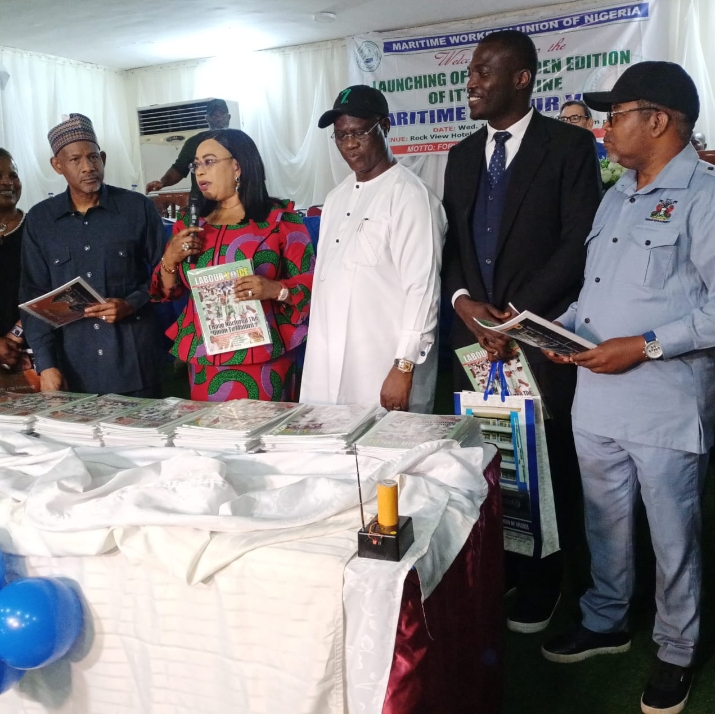
By Izuchukwu Ozoemena
The Maritime Workers’ Union of Nigeria, (MWUN) has given special tribute to employers of dockworkers, regulators and other stakeholders who, by the special attention they are giving to the wellbeing of the labour force under them, are enormously contributing to the stability and growth of the maritime sector.
MWUN President-General, Prince Adewale Adeyanju stated this in Lagos, Wednesday, at the unveiling of “Maritime Labour Voice”, the Union’s inhouse publication.
He stated that the primary purpose of the magazine is to provide a strong voice from the dock labour force on how best to contribute in promoting a harmonious working environment that would stimulate industrial peace as the medium represents what he referred to as “the voice of the voiceless.”
Delivering a special lecture on the topic “The Marine and Blue Economy: It’s Impact on Maritime Workers,” foremost maritime lawyer, Barr. Osuala Nwagbara described maritime workers and seafarers as the engine room and eyes with which the maritime industry sees. A clean and unpolluted ocean, he explained, has a lasting effect on seafarers.
“According to the United Nations, 40% of the world population live near coastal areas; 80% of world trade is achieved using the seas. The oceans, seas and coastal areas contribute to food security and poverty reduction. And yet, the ocean is under severe threat by human activities, where economic profit are at the expense of environmental degradation.
“Acidification, pollution, ocean warming and fishery collapse are just some of the examples of the consequences on the marine ecosystem. These threats are detrimental to the planet and have long term repercussions that demand urgent action to protect the oceans and the people who depend on them.”
Nwagbara counselled a viable use of the ocean economy in line with the concept of blue economy to sustain life on earth. This ocean economy entails the oceans, seas and marine resources conservation, sea pollution reduction and decarbonised shipping, he told the quality audience.
“In 2015, all United Nations Member States adopted a development policy on sustainability which centers around the 17 Sustainable Development Goals (SDG). The 17 goals provide a global blueprint for peace and prosperity of people and the planet and are set to be achieved by 2030. Goal 14, titled Life Below Water, concerns conservation and sustainable use of the oceans, seas and marine resources for sustainable development, and demands international cooperation for the oceans to get back in balance.”
Reaching Goal 14 requires universal action to protect the planet and require the collaboration of global and regional blocs within the international community and requisite legal frame work for its implementation.”
The oceans and seas are a main source of food, energy and minerals, and are being used for different purposes. Common examples are fisheries and aquaculture, and the processing and trade of these resources. The maritime transport also plays a big role in the global market in the form of containerships, tankers, and ports for the vessels. Furthermore, coastal tourism is the largest business within ocean activities in terms of employment.”
He recommended the
enforcement of globally applicable IMO rules by flag States and port States, national laws and regulations by national Maritime Administrations, as applicable. The importance of this lies in promoting and driving the marine and blue economy. Effective promotion of marine and blue economy will have a positive impact on Maritime Workers, he explained.
In his remarks, Comrade Charles Agada, Port Manager, Apapa Port, hailed the MWUN and its leadership for coming up with the idea of an inhouse voice as “Maritime Voice” symbolizes the strength of the Maritime Worker’s Union. The entire gamut of port operations is embedded in the new Ministry, he restated.
NPA’s Mrs. Sarah Bala who stood in for the MD described the Blue Economy as a game changer in Nigeria. To Mrs Bala, the Assistant Director, Corporate and Strategic Communications in the agency, “everything you see in the country is a product of the Blue Economy”.
She commended the MWUN for coming out with a magazine and urged that the tempo be sustained.
The Chairman of the event, Dr (Mrs) Vicky Haastrup, President, Seaport Terminal Owners Association of Nigeria (STOAN) lauded MWUN for contributing immensely to the growth and development of the Nigerian economy. “If the right policies are made and the right things are done, the maritime sector can solve the economic problems of Nigeria”, the Executive Vice Chairman of ENL Consortium Ltd stated. She praised the leadership of MWUN for the wonderful initiative of publishing a magazine which is timely and designed to richly contribute to the growth of the industry.
Customs
NSC Boss, Akutah, Speaks At Maritime Journalists’ Seminar, Harps on Developing Trends the Press Cannot Overlook.
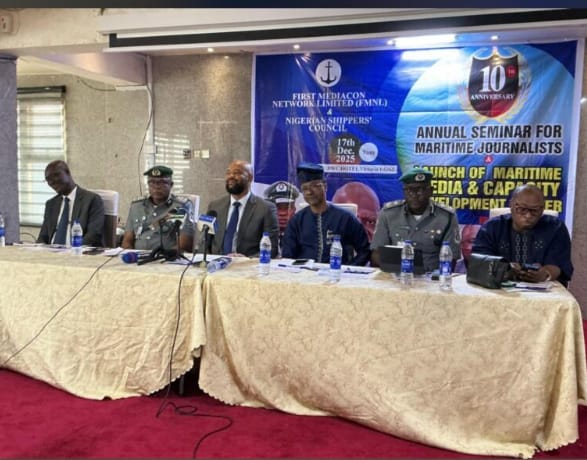
By Izuchukwu Ozoemena
It has been canvassed that as the maritime industry grows in complexity, driven by digitalization, new trade realities, regulatory reforms and global logistic shifts, journalism practice within the space should toe the same line.
Dr Pius Ukeyima Akutah, the Executive Secretary/CEO of the Nigerian Shippers’ Council (NSC) stated this in a keynote address he delivered in Lagos, Thursday, during the 10th Anniversary Annual Seminar for Maritime Journalists hosted by First Mediacon Network Ltd, publishers of Shipping Position Daily.
Acknowledging that the Nigerian Shippers’ Council has benefitted immensely from the sustained and professional coverage offered by the maritime press, more collaborative efforts is needed to enhance efficiency and competitiveness in the port environment. He was represented by the agency’s Director of Special Duties, Mr Moses Abere.
”This decade-long journey affirms a simple truth: no maritime sector can advance without a strong, knowledgeable and committed media community.” Akutah added.
Strengthening maritime journalism for the future, he noted, requires technical accuracy, understanding of global practices and an appreciation of regulatory frameworks.
The journalist should also be equipped to interrogate data, utilize digital tools and apply emerging technologies such as Al in research, storytelling and analysis.
He added that in a sensitive sector such as maritime, misinformation can undermine policy, investor confidence and national economic stability.
”At the Nigerian Shippers’ Council, we remain committed to open communication and structured engagement with the media to enhance mutual understanding and sectoral development.”
Akutah assured that the NSC would continue to partner with the press through knowledge-sharing, capacity-building collaborations and joint initiatives that support a more informed and capable maritime media landscape.
”As the Port Economic Regulator, the Nigerian Shippers’ Council remains committed to promoting efficiency, transparency and competitiveness within the maritime sector.”
”We consider the media as essential partners in informing stakeholders, shaping public understanding and strengthening accountability.”
”We will continue to support credible and responsible maritime journalism and are open to meaningful engagements that enhance professionalism and knowledge within the press community.”
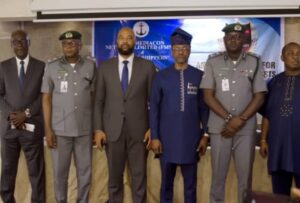
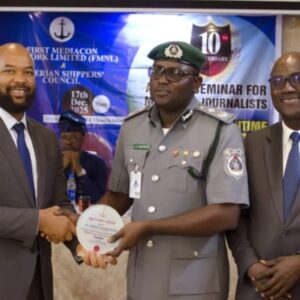
Dr Akabogu (left) presenting a souvenir to Dr Maiwada, National PRO, Nigeria Customs Service.
As the press celebrates
a 10-year milestone, Akutah advised, there should be a commitment to build a stronger future, one defined by accurate information, robust collaboration and shared progress.
Unveiling the Centre for Maritime Media & Capacity Development at the event, Mr Sesan Onileimo, CEO First Mediacon Network Ltd stressed the need to future-proof maritime reporting in Nigeria. The new Centre, he said, was created to respond to rapid changes reshaping journalism and the maritime sector.
“The maritime media space is evolving rapidly under the pressure of digitalisation, artificial intelligence and social media. This Centre is our bold response to ensure journalists remain knowledgeable, relevant and impactful, regardless of how long they have been on the beat,” Onileimo explained.
The Centre, he added, would not only take over the organisation of the annual seminar but would also deliver continuous, year-round manpower development programmes for maritime journalists and content creators.
“What we are doing is moving from an annual event to a permanent structure for capacity development. The Centre is also open to partnerships with industry stakeholders who share our vision of a stronger and more professional maritime media,” Onileimo added.
Dignitaries at the event included Mr Babandede, ACG Zone ‘A’ of the Nigeria Customs Service accompanied by the National Public Relations Officer, Dr Aliyu Maiwada, notable maritime lawyer Dr Emeka Akabogu (SAN) and Dr Kayode Farinto, former Acting National President of ANLCA.
Maritime Agencies
NIGERIA’S IMO FEAT: NIMASA Hails Media Contributions, Seeks Support For Sustained Momentum.

By Izuchukwu Ozoemena
The Nigerian Maritime Administration and Safety Agency(NIMASA) has acknowledged the invaluable support and contributions of Nigerian journalists, especially the maritime media, to the recent success of Nigeria at the International Maritime Organization(IMO) elections.
It could be recalled that Nigeria won the elusive category C council election at the IMO after 14 years of failed attempts.
Receiving the new leadership of the Maritime Reporters Association of Nigeria (MARAN) led by Mr Tunde Ayodele at the Headquarters of NIMASA, Edward Osagie, the Deputy Director and Head of the Public Relations Department of the agency noted that maritime media complemented the untiring efforts of the Ministry of Marine and Blue Economy and NIMASA to showcase the enormous maritime potentials of Nigeria and its capacity in maritime administration that eventually won the country the coveted global seat.
The NIMASA Chief spokesman highlighted the importance of developmental journalism to nation’s building while admonishing the media, especially maritime media, to guard against reportorial styles that could de-market the country.
”The international community is taking note of every single report we write as journalists about the country and it’s what they use to assess us as a nation.
” That is why it is imperative for us as journalists to allow patriotism and commitment to nation building guide the way we write”
He however frowned at attempt by few journalists to push wrong narrative over the recent incident of the arrest of a vessel, MT SKIPPER , detained by the United States Coast Guard (USCG)over alleged crude oil theft and other transnational crimes.
Osagie reiterated the fact that the detained vessel was neither flying Nigerian flag nor its purported owners, Thomarose Global Ventures Limited, registered with NIMASA as a shipping company.
He said that what identifies a vessel is the flag it flies and since the detained vessel did not carry Nigeria’s flag, those who tried to ascribe its ownership to Nigeria did so either out of sheer mischief or ignorance.
Osagie however lauded MARAN for its responsible journalism, acknowledging the support of its members to NIMASA despite the agency’s perceived shortcomings in their expectations.
” Despite the fact that the agency may not have met all the expectations of members of MARAN, they haven’t written negative reports on our activities and operations” Osagie noted.
” MARAN brand is a brand I am proud of and we are also proud of in the
industry. MARAN has not done badly in its reportorial duties.
”At NIMASA here, we will support anything you request and in any area we are able to support, we will support the administration for a smooth management of the association.
”And by the grace of God, we will not let you down. God bless you.God bless MARAN” NIMASA Chief image maker declared.
Ayodele has led his caretaker committee members to NIMASA to consolidate on the long-standing relationship between the agency and MARAN.
Leading his PR team to receive the MARAN leadership, Osagie expressed happiness on the visit which he believed will further boost the cordial relationship between the two parties
”I am glad that you’re here today. It’s a special day. I’m glad to have you in our midst today” Osagie enthused.
The two parties engaged in frank discussions aimed at enhancing their operations and further boost their shared values and partnership.
Ayodele informed his hosts that MARAN will continue to practise responsible journalism that will enhance the operations of NIMASA in particular and boost the credibility of the country to the outside world.
He therefore asked NIMASA to reciprocate this gesture through actions that will enhance the professional integrity and impact the welfare of his members.
Osagie however pledged the support of the agency for the new caretaker committee and the MARAN as a whole, a situation he said is in alignment with the belief of NIMASA’s management in the values which the agency shares with the association.
Maritime Agencies
OGUN 1 CUSTOMS: No Hiding Place for Smugglers, D.C.Afeni Pledges, Confiscates Exotic Cars, 2bn Worth of Contrabands in 11 Days.
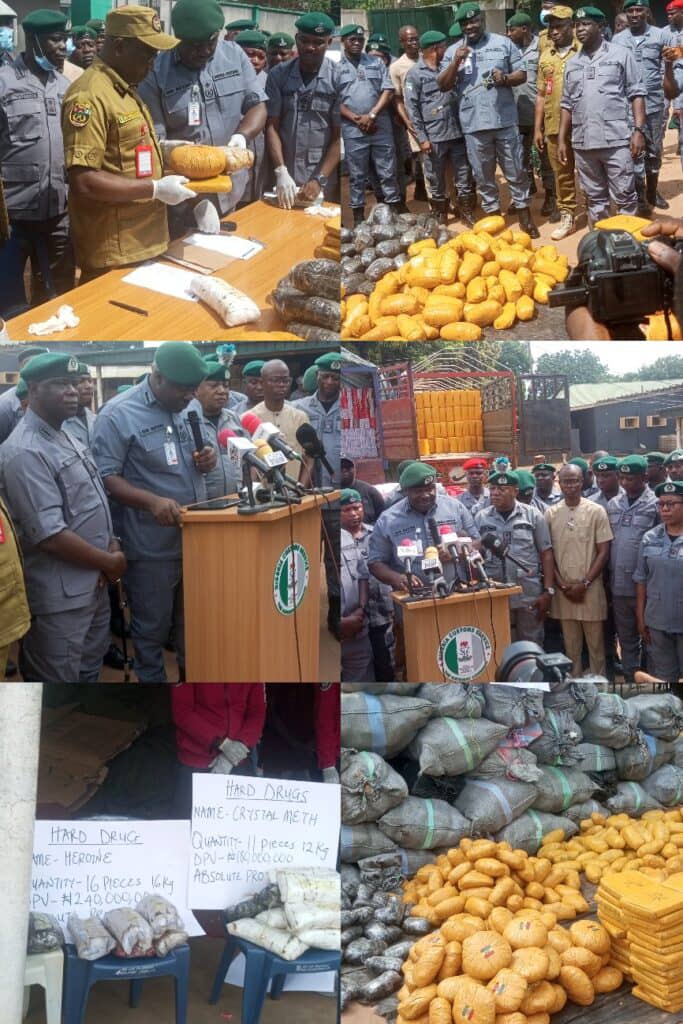
By Izuchukwu Ozoemena
Barely taking over the mantle of leadership in the Ogun 1 Customs Area Command of the Nigeria Customs Service (NCS) following the transfer of Comptroller Godwin Otunla to the Murtala Muhammed Airport Command, the ‘brand new’ Acting Customs Area Controller (CAC), Deputy Controller O. O. Afeni, within 11 days, confiscated smuggled items valued at over ₦2 billion. These include exotic cars worth over N28 million. It is recalled that D.C. Afeni mounted the saddle on December 4, 2025 when he was appointed a CAC on acting capacity.
Addressing journalists at the Ogun 1 Area Command, Idiroko , Wednesday, the acting Area Controller declared a renewed crackdown on smuggling activities. He sounded a note of warning to smugglers saying that with him in charge, there will be no hiding place for perpetrators within the Command’s jurisdiction.
Different illicit items the Command intercepted include 16 parcels of heroin (16kg) valued at ₦240 million, 3,355 wraps of Cannabis Sativa worth ₦435.08 million, 2,200 kegs of foreign groundnut oil valued at ₦264 million, and 5,417 cartons of foreign spaghetti estimated at ₦162.51 million. The seizure, the Acting CAC observed underscores the command’s intensified efforts to curb the influx of illicit drugs and smuggled goods through Nigeria’s southwestern border corridors.
Also confiscated were narcotics which were handed over to the National Drug Law Enforcement Agency (NDLEA). Accepting the narcotics, the Idiroko Area Commander of NDLEA, Ekundayo Williams commended DC Afeni for what he described as spectacular seizures.
-

 Maritime Agencies2 weeks ago
Maritime Agencies2 weeks agoIndustry Gurus Head To Badagry As BACCIMA, Portbizness Discuss Trans-Border International Trade.
-

 Maritime Agencies5 days ago
Maritime Agencies5 days agoFIGHT AGAINST FINANCIAL CRIMES: MMIA CAC Makes Huge Haul of Foreign Currencies, Hands Over To EFCC
-
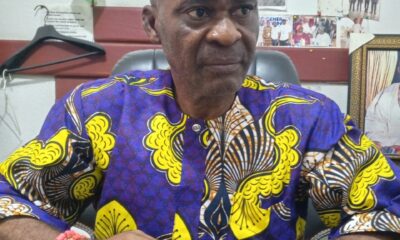
 Maritime Agencies2 weeks ago
Maritime Agencies2 weeks agoMARITIME SEMINAR FOR JUDGES: Group Urges Probe of Shippers’ Council Funds.
-

 Maritime Agencies2 weeks ago
Maritime Agencies2 weeks agoOGUN 1 CUSTOMS: DC Oladapo Afeni Pledges Stronger Trade Facilitation, Border Security As He Becomes Acting CAC.
-

 Maritime Agencies1 week ago
Maritime Agencies1 week agoWIKE AT 62: TSSL Celebrates Courage, Conviction and Unwavering Sense of Duty.
-
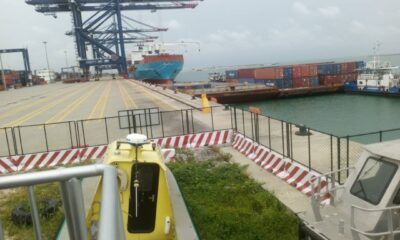
 Maritime Agencies5 days ago
Maritime Agencies5 days agoLekki Deepsea Port Set to Achieve Full Capacity Before Expectations, Deepens Barge Operations, among others.
-
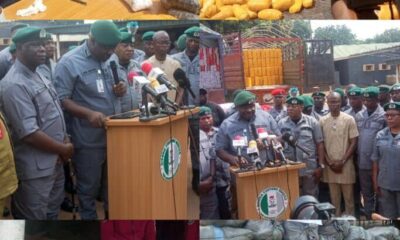
 Maritime Agencies4 days ago
Maritime Agencies4 days agoOGUN 1 CUSTOMS: No Hiding Place for Smugglers, D.C.Afeni Pledges, Confiscates Exotic Cars, 2bn Worth of Contrabands in 11 Days.
-
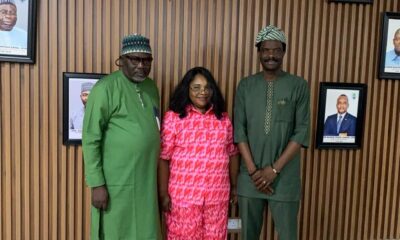
 Maritime Agencies4 days ago
Maritime Agencies4 days agoNIGERIA’S IMO FEAT: NIMASA Hails Media Contributions, Seeks Support For Sustained Momentum.


